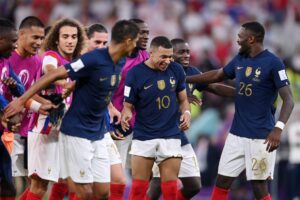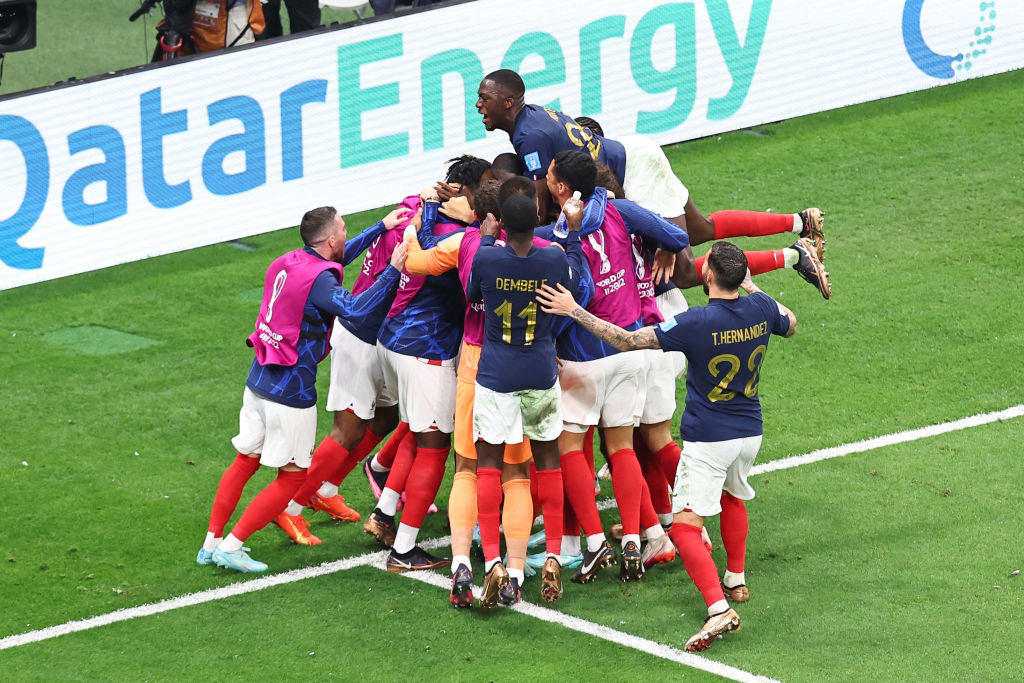Morocco came to Qatar, charmed millions of fans, provided many moments to savour for their supporters, families and the world at large, and now they’re going home, albeit after the non-event that is the third-place match. On Wednesday night against France, they were confronted by two of football’s most brutal truths – the game is ultimately about scoring goals, and the team with greater nous invariably wins.
As for France, they’re into a second straight World Cup final, without ever really moving out of third gear. Lionel Messi and Argentina can either take heart from the lack of French fluency, or they can be terrified by what the French could be capable of when they find that collective stride.
In Russia four years ago, France overcame a sluggish start in the group phase – just three goals in three matches – before exploding into life against Argentina (4-3) and Uruguay (2-0). Highly fancied Belgium were seen off by a Samuel Umtiti goal in the semifinal, before Croatia found themselves on the wrong end of the 4-2 thrashing.
That Argentina game, of course, was the one that announced the thrilling talent of Kylian Mbappe to the world at large. Followers of European football had seen what he could do with Monaco and Paris Saint-Germain (PSG), but this was the first time he had sparkled on the world stage. And how! Argentina led for nine second-half minutes before Benjamin Pavard’s once-in-a-lifetime equaliser, but it was Mbappe that buried Messi’s dream that day with two goals that showcased his searing pace, strength and clinical finishing.
At this World Cup, France have been a team transformed. Against England in the quarterfinal, they had just 43 per cent possession. They saw even less of the ball against Morocco – 38 per cent. But like Muhammad Ali, boxing’s Greatest, when he returned from a three-and-a-year ban in the early 1970s, this new avatar is geared to win.
Ali soaked up punishment against ferocious punchers like Joe Frazier, George Foreman, Ken Norton and Oscar Bonavena before asserting himself and his skills to win fights. The dominant Ali of his 1960s heyday – the one who punched Ernie Terrell into a stupor while asking him ‘What’s my name?’ – was a distant memory by then.
Morocco had their chances. Achraf Hakimi wasn’t intimidated in the slightest by going up against Mbappe, his best buddy at PSG, while Azzedine Ounahi had another superb game at the heart of Morocco’s midfield. Had his wonderful curling shot from distance not been pushed on to the post by Hugo Lloris towards the end of the first half, it might have been a different game.
But you sensed that France always had something in reserve. Each time Mbappe broke clear, sprinting toward the box after hurdling desperate tackles, you could sense the fear in the stands and on the Moroccan bench. When he was in the vicinity of the penalty box, he would usually be surrounded by at least three or four red shirts. It was no coincidence that both French goals came from Mbappe mishits that deflected off Moroccan defenders. They were so focused on stopping him that the likes of Antoine Griezmann and Ousmane Dembele often found themselves in acres of space.

No one was watching Theo Hernandez for the early goal that set the tone for the rest of the match, and Randal Kolo Muani, a product of Nantes’ famed youth system, drifted in unchallenged at the far post for the decisive second. This is not to be too critical of Morocco. Few teams could cope with the loss of three first-choice defenders. They gambled on the fitness of Nayuef Aguerd, Romain Saiss and Noussair Mazraoui. Aguerd didn’t even make it past the warm-up. The other two didn’t get to the second half.
The replacements were excellent. No Moroccan player should have left the field disappointed because they gave it absolutely everything. But the reality is that Jawad El Yamiq, who dived in for the tackle that sent Griezmann on his way to set up the first goal, plays for promoted Real Valladolid, who have already lost seven of their 14 matches in La Liga this season. For him and many of those players, this was a step up in class too far.
And what can you say about France? Deprived of the services of N’Golo Kante, Paul Pogba, Karim Benzema and Christopher Nkunku even before their opening match, they have since seen Lucas Hernandez limp out and Pavard benched. Adrian Rabiot was too unwell to even make the squad against Morocco, and Dayot Upamecano was only fit for a place on the bench.
It didn’t matter. France, like all great teams, did what they had to do. Had Morocco managed to score, you know they would have had something more in reserve. Not since Brazil in 1998, nearly a quarter century ago, has a team made the final in its title defence. France have done so with something to spare, even though the semifinal was the first clean sheet they’ve kept in the competition.
When it came to the crunch, Morocco found themselves in the unfamiliar position of having to set the tempo. Before this match, the most possession they had enjoyed in a game was 41 per cent against Canada in the group stage. A team geared to counterattack suddenly found itself having to force the pace once France scored early. And that always left them vulnerable to lightning breaks from the likes of Mbappe.
You also can’t win trophies without goals. Morocco managed five in six matches. Someone might pipe up and say that Spain won in 2010 while scoring just eight. The difference is that Spain controlled their matches, barely giving opponents a sniff of the ball. When you cede as much possession and territory as Morocco tend to, you have no option but to be clinical with the chances you get.
So, while north Africa’s greatest-ever goalscorer, Egypt’s Mohamed Salah, sat and watched the World Cup at home, Morocco – a team that had everything apart from the cutting edge – found out the hard way that indomitable spirit can only take you so far if you can’t put the ball in the back of the net.




